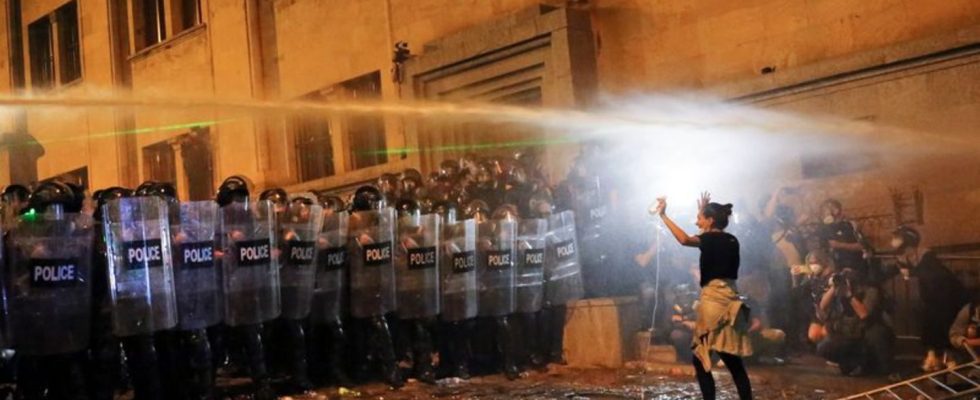Georgia
More than 60 arrests during protests in Tbilisi
A protester faces riot police in Tbilisi. photo
© Zurab Tsertsvadze/AP/dpa
The Georgian capital Tbilisi has had a night of police violence. The mass protests are about a controversial law and the question: Will Georgia go to Europe or not?
The police in the EU accession candidate Georgia says it has arrested 63 participants in mass protests critical of the government. This was said by the Deputy Interior Minister of the South Caucasus Republic, Alexander Darakhvelidze, in the capital Tbilisi.
During the night, the security forces used tear gas, water cannons and batons against the crowd of tens of thousands of people. For weeks, their protests have been directed against government plans to prevent alleged foreign influence on Georgian civil society. The deputies in the parliament of the former Soviet republic have now continued the second reading of the controversial law.
Among those arrested was Levan Khabeishvili, the leader of the largest opposition party, the United National Movement (UNM). Khabeishvili published a photo showing his face swollen with blood. He stated that he had been ill-treated by the police. The security forces used force against the demonstrators on Tuesday evening and pushed them away from the parliament building. The situation only calmed down at night. New protests have been announced for Wednesday.
Critics fear misuse of the planned law
The bone of contention is a law like the one in Russia that classifies non-governmental organizations that receive money from abroad as foreign agents. Many projects to promote democracy in the ex-Soviet republic work with money from EU countries or the USA. The ruling Georgian Dream party speaks of greater transparency. Critics expect the Moscow-style law to be misused to stop money flows and persecute pro-Western forces. The Georgian Dream party, which has been in power since 2012, is becoming increasingly authoritarian ahead of the parliamentary elections in the fall. The pro-European demonstrators fear that this course will endanger the hoped-for accession to the EU.
The EU foreign policy chief Josep Borrell criticized the police operation against peaceful demonstrators. “Georgia is a candidate for EU membership. I call on the authorities to guarantee the right to peaceful assembly,” he wrote on the social network X (formerly Twitter). “The use of force to suppress this is unacceptable.”

